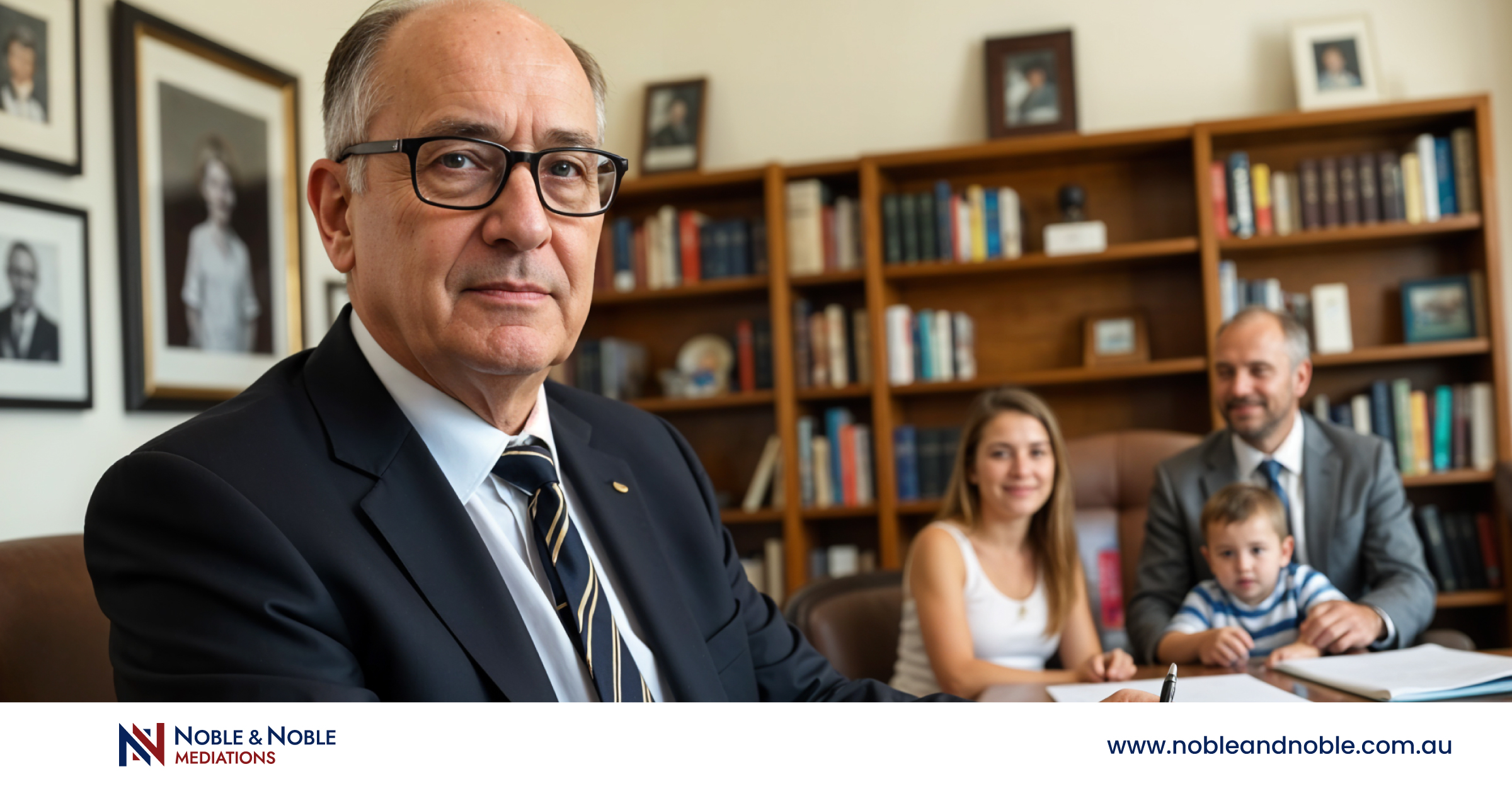
Why Choose Family Mediation in Brisbane for Parenting & Property Disputes?
Family mediation in Brisbane offers a structured and cost-effective way to resolve parenting and property disputes without going to court. It allows separating couples to negotiate agreements with the help of a neutral third party, focusing on fair outcomes that benefit all involved, especially children. Unlike litigation, mediation promotes open communication, reducing stress and emotional toll. In Brisbane, family mediation is often a preferred approach due to its flexibility and ability to tailor solutions to individual circumstances. This guide explores how family mediation works, its benefits, and why it is an excellent choice for resolving family-related disputes.
Table of Contents
What is Family Mediation?

Family mediation is a voluntary and confidential process that helps couples resolve disputes regarding children, finances, and property after separation. A trained mediator facilitates discussions, ensuring both parties are heard and guiding them towards mutually agreeable solutions. Unlike court proceedings, which can be adversarial, mediation focuses on cooperation and problem-solving. It is particularly beneficial in reducing conflict, improving communication, and preserving relationships. Mediation is not about taking sides or making legal decisions but rather providing a structured environment where individuals can negotiate fair and practical agreements that suit their family’s unique needs.
How Family Mediation Works in Brisbane?
The family mediation process in Brisbane typically follows a structured approach: an initial consultation to assess suitability, followed by joint mediation sessions where parties discuss their concerns and work towards an agreement. A mediator ensures discussions remain productive and focused on solutions rather than conflict. Sessions can be held in person or online, making mediation accessible for all. Once agreements are reached, they can be formalised into legally binding documents such as parenting plans or financial agreements. The process is usually quicker and less stressful than going through the Family Court, making it a preferred option for many families.
Benefits of Family Mediation for Parenting Disputes
Mediation helps parents develop co-parenting plans that prioritise their children’s wellbeing. Unlike court-imposed decisions, mediation allows parents to customise agreements based on their family’s unique situation. This process fosters cooperation, reduces hostility, and helps children adjust more smoothly to changes. Mediation encourages parents to focus on solutions rather than blame, leading to better long-term relationships. Additionally, agreements made through mediation are more likely to be followed, as both parents have actively contributed to the decisions. By avoiding lengthy court battles, mediation also minimises emotional and financial strain on families.
Benefits of Family Mediation for Property Disputes
Dividing assets and finances after separation can be complex and stressful. Mediation provides a fair and structured process for discussing asset division, superannuation, debts, and other financial matters. It is often much faster and more affordable than going to court, allowing couples to reach settlements amicably. Mediation also gives both parties control over the outcome rather than leaving decisions to a judge. Since financial agreements made in mediation can be formalised through consent orders, they carry legal weight. This method reduces stress, saves money, and ensures a balanced resolution that considers both parties’ future financial stability.
The Legal Framework of Family Mediation in Brisbane
In Australia, the Family Law Act 1975 encourages dispute resolution before resorting to court proceedings. In many parenting cases, attending Family Dispute Resolution (FDR) is a legal requirement before applying to the Family Court. Accredited family mediators help facilitate these discussions and issue a Section 60I Certificate if mediation is unsuccessful. Property mediation is not legally required but is strongly recommended for reaching fair settlements. Agreements reached in mediation can be made legally binding through parenting plans, financial agreements, or consent orders, ensuring compliance and enforceability. Mediation aligns with Australian family law principles of fairness and child-focused decision-making.
Who Should Consider Family Mediation?
Family mediation is ideal for couples going through separation or divorce who need to resolve disputes regarding children or property. It is particularly beneficial for parents who wish to maintain a cooperative co-parenting relationship and avoid the adversarial nature of court proceedings. Mediation is also suitable for individuals who want a fair division of assets without the high legal costs associated with litigation. While mediation works best when both parties are willing to negotiate, even high-conflict situations can benefit from structured discussions. However, cases involving domestic violence or power imbalances may require legal intervention.
How to Prepare for a Family Mediation Session?

Proper preparation is crucial for a successful mediation session. Start by gathering all relevant documents, such as financial statements, property valuations, and parenting schedules. Consider your goals and priorities—what outcomes are essential for you? Be open to compromise, as mediation is about finding mutually acceptable solutions rather than “winning.” It is also helpful to seek legal advice beforehand to understand your rights and obligations. Effective communication is key, so approach the session with a constructive mindset. A well-prepared mediation session increases the likelihood of reaching a fair and lasting agreement.
Choosing the Right Family Mediator in Brisbane
Selecting a qualified and experienced mediator is essential for a productive mediation process. Look for Nationally Accredited Mediators or Family Dispute Resolution Practitioners (FDRPs) who specialise in family law. Check their credentials, experience, and client reviews to ensure they align with your needs. Some mediators have expertise in high-conflict situations, while others focus on financial settlements. Ask about their approach and fees upfront. Many Brisbane-based mediation services offer free initial consultations to discuss your case. Choosing the right mediator can significantly impact the success of your mediation and the fairness of the outcome.
Common Misconceptions About Family Mediation
Many people believe mediation is only for amicable couples, but it can also be effective in high-conflict situations. Another myth is that mediators make final decisions—however, mediators facilitate discussions but do not impose solutions. Some also think mediation outcomes are not legally binding, but agreements can be formalised through consent orders, giving them legal enforceability. Lastly, some assume mediation is only about compromise, but it actually empowers individuals to negotiate fair, balanced solutions that work for their specific circumstances. Understanding these misconceptions helps people approach mediation with realistic expectations and confidence.
Conclusion
Family mediation in Brisbane is an effective, affordable, and less stressful alternative to court for resolving parenting and property disputes. It allows separating couples to negotiate fair agreements while prioritising the well-being of their children and financial stability. With the right mediator, preparation, and a willingness to cooperate, mediation can lead to long-term, sustainable solutions. If you are considering mediation, seeking professional guidance from a Brisbane-based mediator can help you navigate the process smoothly. Contact a reputable family mediation service today to explore your options and work towards a positive resolution.
Frequently Asked Questions about Family Mediation Brisbane
Is there a downside to mediation?
While mediation offers many benefits, it may not be suitable for all situations. For example, if there is a significant power imbalance or history of abuse, mediation might not be effective. Additionally, mediation requires both parties to be willing to cooperate and negotiate. If one party is unwilling, the process can fail, and other options, like court, may be necessary.
Is mediation free in Queensland?
Mediation is not always free in Queensland. However, some services, such as government-funded Family Dispute Resolution (FDR), may offer free or subsidised mediation for eligible individuals. Private mediation services typically charge fees, which vary based on the mediator’s experience and the complexity of the case.
What are the 5 steps of mediation?
The 5 basic steps of mediation are:
- Introduction – The mediator explains the process and ground rules.
- Issue Identification – Both parties express their concerns and outline the issues at hand.
- Exploration – The mediator facilitates discussion to explore possible solutions.
- Negotiation – Both parties work together to find a mutually agreeable resolution.
- Agreement – The mediator helps finalise the terms of the agreement, which can be legally binding.
What is not suitable for mediation?
Mediation may not be appropriate if there is a history of domestic violence, abuse, or coercion. Disputes involving serious criminal behaviour, such as child abuse, may also require legal intervention. Additionally, if one party is unwilling to participate or negotiate in good faith, mediation is unlikely to succeed.
Why do people avoid mediation?
Some people avoid mediation due to misconceptions that it won’t work for them, or they may feel it won’t be effective if the other party is not cooperating. There is also a belief that mediation only works for amicable situations, but in reality, even high-conflict cases can benefit from structured mediation. Others may avoid mediation because they prefer a court decision, which they believe might provide a clearer or more definitive resolution.
Is mediation faster than going to court?
Yes, mediation is typically much faster than going through the court system. Mediation sessions can often be completed in a few hours or days, while court proceedings can take months or even years. Mediation also allows more flexible scheduling, whereas court cases are subject to the court’s timeline.
Where to start with mediation?
To start with mediation, you can contact a qualified family mediator or mediator service. In Queensland, you may be referred to Family Dispute Resolution (FDR) services through the Family Relationships Advice Line or other government-funded programs. It’s also advisable to consult a family lawyer to understand your rights and explore your options before proceeding.
If you need help, feel free to Contact Us at any time at Noble & Noble Mediations. We have qualified mediators ready to help.
Call Us for 24/7 support – 0497 434 460
Find Qualified Brisbane Family Mediators at Noble & Noble Mediations on google maps.




